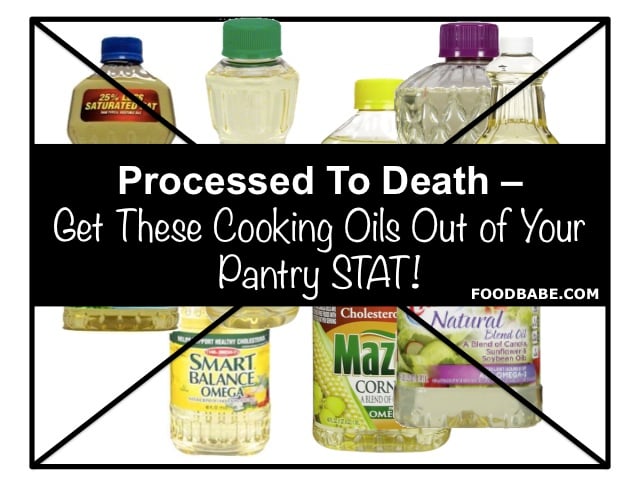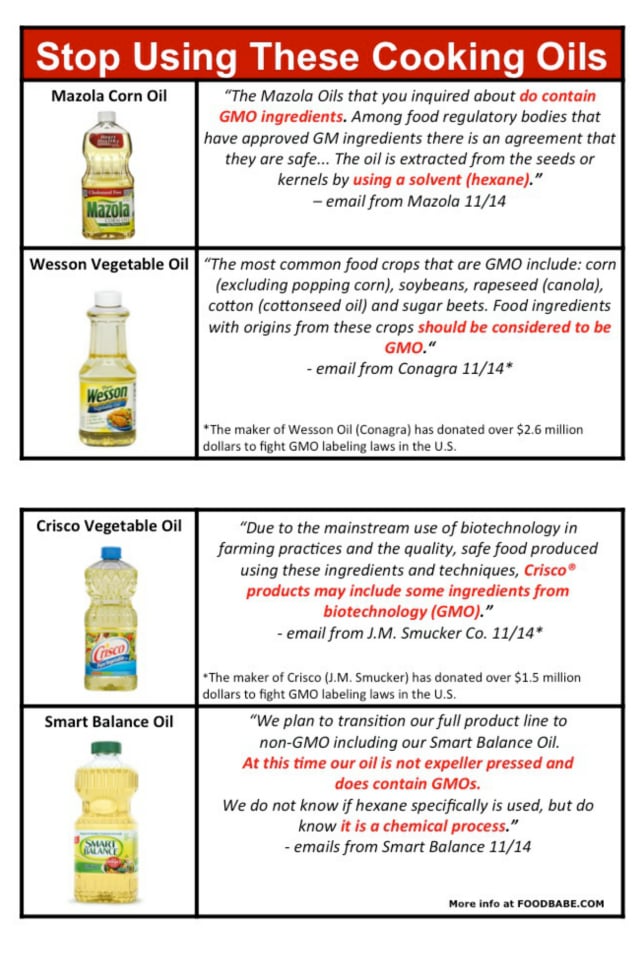Whenever I see the chefs on Food Network using canola oil I want to scream at the TV… and I have to admit, I sometimes do.
That’s because for years I was misled into thinking that canola oil was healthy and would buy quarts of it. I recently received an email newsletter from “CanolaInfo.org” with their “Top 10 Pantry Essentials” for a healthy 2015, and of course canola oil was at the top of their list. The canola industry is doing an amazing job marketing canola oil as “heart healthy” and “natural”, but it’s a total sham. I feel the same way about corn oil and recent commercials proclaiming that it’s healthier than olive oil. We’re being persuaded to believe these oils are healthy, thanks in part to the work of the Canola Council, the Corn Refiners Association, and their own (industry funded) research. In reality, these popular oils have been mass marketed as “healthy” largely based on biased research, and after you hear the truth you will avoid them like the plague. Here’s why:
They Are Processed to Death…
Most cooking oils go through an insane amount of processing with chemical solvents, steamers, neutralizers, de-waxers, bleach and deodorizers before they end up in the bottle. If you watch this video on the modern canola oil making process, and you’ll see exactly what I mean.
What they don’t tell you in this video is that the “solvent” that is most often used to extract the oil is the neurotoxin hexane – and as you can see it’s literally bathed in it. Hexane is a cheap byproduct from gasoline production, that’s a serious occupational hazard and toxic air pollutant. It’s been shown that some hexane residue can remain in the oil, and the FDA doesn’t require food manufacturers to test for residues. Residue tests done by the Cornucopia Institute in 2009 found hexane residues in soybean oil. So, we very well could be eating this chemical everytime we cook with hexane-extracted oils. Almost all toxicology research focuses on the industrial use and inhalation of hexane, so no one knows exactly how dangerous eating it is – but it surely isn’t healthy.

What about “Expeller Pressed” oil?
This means that the oil was mechanically extracted with a screw press. This traditional way of making oil is much healthier than using hexane – but the big oil manufacturers don’t like this method because it’s less effective (less oil is made) and it’s more expensive. So, it’s used less often. The expeller pressing process can cause a lot of heat that can make the oil go rancid, so some companies take it step farther and cold press their oils at temps of no more than 80°F to 120°F, which is labor intensive but produces the best oils. Beware that although the term “cold pressed” is regulated in Europe, it’s not very well regulated in the U.S. and cold pressed oils could technically be made at high temperatures – so I don’t take this term on a label at face value.
Cooking Oils To Avoid:

- Canola Oil – To better understand this oil, it helps to know where it comes from. Canola oil is extracted from rapeseed plants, that have been bred to have lower levels of toxic erucic acid. Before it was bred this way, it was called Rapeseed Oil and used for industrial purposes because the erucic acid in it caused heart damage in animal studies. It got the fancy new name “canola”, but it still contains trace amounts of erucic acid (up to 2%, which they consider “safe”). In 1995 they also began genetically engineering (GMO) rapeseed to be resistant to herbicides, and now almost all canola crops in North America are GMO. Canola oil consumption has been linked to vitamin E deficiency and a shortened life span in animal studies. Research has also found some trans fats in canola oil, which were created during the heavy processing that it goes through. These trans fats are not labeled. This is ironic because trans fats are the opposite of heart healthy! According to the Weston A. Price Foundation:
“Like all modern vegetable oils, canola oil goes through the process of caustic refining, bleaching and degumming–all of which involve high temperatures or chemicals of questionable safety. And because canola oil is high in omega-3 fatty acids, which easily become rancid and foul-smelling when subjected to oxygen and high temperatures, it must be deodorized. The standard deodorization process removes a large portion of the omega-3 fatty acids by turning them into trans fatty acids…research at the University of Florida at Gainesville, found trans levels as high as 4.6 percent in commercial liquid oil… they are not listed on the label”.
Mazola and Crisco brands both admit to using GMOs and hexane extraction in their processing. Wesson oil never responded to our inquiries about hexane, however they confirmed that GMO canola is used. Note: Spectrum Organics brand does not use hexane to process their canola oil, and as with any organic oil, it’s non-GMO. However, I don’t consider canola a healthy oil and would choose another type of oil instead.
- Cottonseed Oil – I consider this the worst oil of all. It’s a byproduct of the cotton crop that’s inundated with pesticides and chemicals because it’s regulated as a textile crop – not food! Cotton farming also may be killing India’s farmers, as harsh pesticides sicken them and thousands more have committed suicide – many after the costly GMO seeds they used failed (sources 1, 2, 3). Being of my Indian descent, I am saddened and infuriated by this unspeakable tragedy on a scale that is hard to express. There is nothing more insidious and despicable than an industry that preys upon the health, safety, and lives of innocent victims. Cottonseed oil does not belong in our food supply and should be strictly avoided. Thankfully, most cooking oils in the grocery store no longer contain cottonseed oil, and this ingredient is mostly relegated to the processed food aisle. Cottonseed is widely being replaced in cooking oils with another oil that I avoid: soybean oil.
- Soybean Oil – Most products that just say “Vegetable Oil” are made from soybeans. It’s so common in processed foods that up to 20% of calories in the typical American diet is thought to come from soybean oil. Soybean oil is high in omega-6 fatty acids, and our bodies need this type of fatty acid, but today people are getting too much of it through processed foods – up to 20 times more than required, according to some estimates. The overabundance of omega-6 fatty acids increases the risk of inflammation, cardiovascular disease, cancer, and autoimmune diseases. Soybean oil is also typically made from GMOs, as 94% of U.S. soybean crops are genetically modified. A recent survey showed that most Americans use “Wesson Vegetable Oil”, which is now made from soybeans (previously cottonseed). When we contacted Wesson, they confirmed they use GMOs in their oils (soybean, corn, canola). Wesson brand is owned by Conagra Foods, which has donated over $2.6 million dollars to fight GMO labeling laws in the U.S., so everytime you buy their products you help fund these anti-labeling campaigns. Smart Balance cooking oil is a soybean oil blended with canola and olive oils. Smart Balance told us, “we plan to transition our full product line to non-GMO including our Smart Balance Oil. At this time our oil is not expeller pressed and does contain GMOs.” and “We do not know if hexane specifically is used, but do know it is a chemical process”. When we pushed Smart Balance to confirm whether they use hexane, their only response was that it “is processed using conventional methods”. Other cooking oils that are often extracted with hexane and are high in omega-6 fatty acids include sunflower and safflower.
- Corn Oil – Have you seen Mazola’s latest marketing campaign touting that corn oil lowers cholesterol better than olive oil? Would it affect your opinion if I told you that Mazola’s parent company (ACH Food Companies) partially funded a study that they base this claim on? It definitely affects my opinion. The truth that they don’t mention in their commercials is that corn oil is highly refined, hexane-extracted from GMO corn, and loaded with omega-6 polyunsaturated fatty acids that are unstable when exposed to heat. This instability causes oxidation, a process that generates free radicals. Free radicals are renegade molecules in the body that damage cells, triggering a host of diseases from liver damage to cancer. We contacted Mazola and they confirmed that their cooking oils are made from GMOs (corn, soybean, canola) and that they use hexane extraction for all oils, except for their olive oils.

The Only Cooking Oils In My Kitchen:
I cook with a variety of oils, depending on what I’m cooking. Only some oils are stable when exposed to heat, so I choose those oils for sautéing and stir frying, and the others work great for cold items like salad dressing. I generally look for unrefined, expeller pressed organic oils, and verify cold-pressed claims by contacting the company directly, only buying from those I trust. GMOs and hexane extraction are prohibited in organic oil production, so you can avoid those simply by choosing organic oils.
Coconut Oil – Coconut oil is almost completely saturated fat, but don’t let that scare you. That’s because the tropical saturated fat in coconut oil is made up of medium-chain triglycerides (MCT), which have been shown to actually reduce cholesterol and obesity (sources: 1, 2, 3, 4). Nutiva’s virgin oil is organic, expeller cold-pressed, unrefined and never deodorized or bleached. It tolerates temperatures up to about 350 degrees, so it’s great for most baking and medium-high heat sauteing. Nutiva also has a steam refined version (no chemicals) that you can use for cooking up to 400 degrees, so this is my go-to oil for high heat stir fry’s. Other oils that are good for high heat cooking include avocado oil and almond oil.
Extra Virgin Olive Oil – Beware that there’s olive oil fraud going on, and some brands are mixed with unlabeled GMO oils (like soybean oil), so it’s important to find a brand you trust. Check out Papa Vince’s oil which is simply cold pressed from fresh green olives, and has amazing health benefits. I like to use olive oil to make my own salad dressings.
Extra-Virgin Sesame Oil – It naturally contains vitamin E (an antioxidant), vitamin B-6, zinc, magnesium, calcium, copper and iron. Unrefined sesame oil is best used for low-heat sauteing and works great when used sparingly as a condiment because it has a strong flavor. A naturally refined version is better for high-heat stir frys.
Nutiva Hemp Oil – This is one of my favorite oils, but it’s only good for cold applications like salad dressings, dips and smoothies. Hemp oil contains more essential fatty acids than any other nut or seed oil, with the omega-3 and omega-6 fatty acids in the optimal ratio. Hemp is also the world’s most sustainable crop, so I love these products. This oil is delicate and should be kept in the fridge and used within 3 months. Other good oils for salad dressings include walnut oil and flaxseed oil.
Nutiva Red Palm Oil – This oil has a light buttery flavor, and I love it on popcorn. It’s higher in vitamins A and E than other cooking oils. It’s also been shown to reduce cholesterol and cardiovascular disease. It has about at 300 degree smoke point, so it tolerates medium-heat cooking. Also, Nutiva’s vegan shortening is made with their palm and coconut oils, and works great for baking. Note: This is not to be confused with palm kernel oil (conflict palm oil), as Nutiva’s red palm oil is sustainably grown in Ecuador and doesn’t contribute to deforestation or habitat destruction.
I also sometimes use grass-fed butter and organic ghee for cooking, which is clarified butter. If you are wondering more about what butter I use, make sure you check out this post.
If you know someone who is still using canola oil, corn or soy oils in their cooking, please share this post with them! Let’s spread the word to everyone about the healthier choices out there.
Xo,
Vani
P.S. If you want more life changing information about your food and what to buy, you’ve got to check out my books. In my #1 best selling book The Food Babe Way – I teach you even more ways you can break free from the hidden toxins in your food, lose weight, look years younger and get healthy in just 21 days. In my 2nd book, Feeding You Lies, I blow the lid off of the lies we’ve been fed about the food we eat – lies about its nutrient value, effects on our health, label information, and even the very science we base our food choices on. And, my first cookbook, Food Babe Kitchen, contains over 100 mouthwatering recipes to show you how delicious and simple it is to eat healthy, easy, real food. Available anywhere books are sold.








I saw no mention of peanut oil, your view please.
Great question! I would also like to know how does peanut oil compare to the rest?
There was no mention of advocado oil, an extremely healthy as well as having a high smoke point.
What about Avacado oil??
See the section on coconut oil – avocado can be used too!
I’ve noticed a lot of organic non gmo food items contain organic soy bean oil along with safflower/sunflower oil, I get so furious when I cannot find a healthier snack without these oils! What gives? !
Hi Vani,
Is there a brand of Avocado oil that you recommend? Thank you.
What about Costco’s Kirkland brand Canola Oil ?
What about the trisodium phosphate in all these products/ cereals?
I was wondering about Avocado Oil as well. I buy non gmo certified and love it!
What is your take on avocado oil?
See the section on coconut oil – avocado can be used too!
I am a huge supporter of you and trust that you have ALWAYS done your homework thoroughly before pulbishing anything! I can’t wait for your book to come out (I preorderd 6 copies, for myself and gifts!! but in the interim, could you PLEASE address my questions on Grapeseed Oil. Particularly Wildtree’s Grapeseed Oil, which has many many claims to benefits, BUT is not certified Organic, and although they claim ALL their products are non-GMO, none of them carry the Non-GMO Certified lable that I look for… Please advise.
Thanks soooo much for all you do, Vani!!
Just wanting to know about grape seed oil. Thanks.
I follow you on Pinterest but would like to directly pin your articles. Why isn’t there a pin link?
Thank you
Becky, if you hover over the picture with the cursor, you should see a Pinterest button on the upper left of the picture.
Yes I too would like your feedback on avocado oil I use it for frying and saute
macadamian nut oil is good for high heat.
Coconut oil ROCKS! Plus you can heat it up.. No problem!
I am koko for coconut.. also a great oil to put on your skin!
Great research, thank you! I didn’t see mention of grapeseed oil. It’s reported to be good for high heat cooking. You thoughts and findings, Vani? 🙂
What about grape seed oil?
yes, what about grapeseed oil. I just purchased some as I heard that is better for you.
I recently found 100% pure avacado oil by Chosen Foods. Said to contain 10g monounsaturated fat and 2g polyunsaturated fat and 2g saturated fat. Claims to be cold pressed and naturally refined. Their Web site is http://www.chosenfoods
Com and they are located in San Diego CA.
What is your opinion of this product? I like it for cooking as it doesn’t smoke and states it can be safely heated to 500 deg. Thank you for all that you do and can’t wait for your book…
So which of these oils would you recommend for substituting vegetable oil (terribly horrible for you, I know!) for baking? I use butter sometimes, but the baked goods get a little too dense. Is coconut oil a good substitute?
Thanks!
Cynthia
Cynthia, you might want to try Nutiva’s shortening for baking.
PLEASE PLEASE PLEASE address the safety/usefulness/benefits or health risks of using Grapeseed Oil, Food Babe!! Everything I have researched online conflicts with everything else…. I have the same question out to Dr. David Perlmutter as he also skips over that oil in his book….
I wouldn’t care so deeply about getting an answer, except that I am a Wildtree rep and the business is BUILT on their non-GMO, better for everything, high flash point grapeseed oil…. I want to get the skinny from someone who DOESN’T have a vested interest in either promoting OR criticizing Wildtree Grapeseed Oil. I have suspended my sales work with Wildtree until I can get more data, if you don’t have it, please send me to a reliable, trustworthy, source that does! Thanks so much for all you do!!
I always use coconut oil for baking. Make sure you measure it melted, not solid, and try to mix it in near the end of your recipe making so it doesn’t solidify into chunks (I had that happen to me with brownies once).
Which one do you recommend for high heat and frying? and how about sunflower or safflower oils?
Steam-refined coconut oil (like Nutiva’s) or avocado oil for higher heat cooking. Sunflower and safflower cooking oils are often extracted with hexane and high in omega-6 fatty acids.
I use organic sunflower oil. Are the organic oils also extracted with hexane? I have used organic grapeseed oil in the past when I can find it, but organic oils in my area are hard to find. I do use coconut and occasionally peanut, but that one I can’t find in organic.
Kathy, organic oils shouldn’t be extracted with hexane, so you’re good there!
What about organic olive oil???
What about sesame oil? Is that safe?
What about sunflower oil and organic grapeseed oil? Red Palm Oil leaves a weird after taste and my hubby hates real olive oil.
And what about Macadamia oil? I have read that it is one of the very best for us, and it sure has a lovely nutty flavor for salads and cooking. You don’t mention it….?
What are the best suited oils for deep frying ?
How about sunflower oil? Can you please comment on whether sunflower oil can be considered safe? I’ve heard palm oil is very bad for your health and I’m surprised it’s on your good list. But I’m happy to get educated why the dangers are outweighed by benefits: http://www.onegreenplanet.org/vegan-food/is-palm-oil-good-for-your-health/
Regards
Chris
Great Article. What about Palm Olein? I cannot seem to find any good intel on it. It is in Turbano Plantain Chips.
What about sunflower oil? ?
My husband and I just got a deep fryer. Is there an oil you would recommend for this type of cooking?
I’d like to hear your thoughts on grapeseed oil.
Thanks.
What certifications or acrediations do you carry? Are you a dietician? Diplomas? I’m just wondering because you seem to come up with a lot of nutritional information but I’m real leery because I do not see any sort of degrees, acrediations or certifications on this site.
GW University lets Jon Entine head up the Genetic Literacy Project and he has a BA in philosophy and half a degree in journalism:/
Only people with a degree in food health are allowed to comment on a better way of choosing what to eat?
Food Babe has a Masters Degree in E&E…Experience and Enthusiasm. It is apparent that her research extends far beyond any degree that supports only book knowledge. It has been said that it will be people like Food Babe who direct our path forward into a new way of living. Bravo to her dedicated cause and her Experience and Enthusiasm! It is time everyone took up a good cause to support the healing of our world by revealing truth. Don’t let lack of a degree stop you.
Hasn’t it been people with all the degrees and impressive “credentials” that have led us to the sad state of health that we as a country are now in?
All day long I trust those who can use logic and reason to incur common sense – those who “think outside the box” if you will – and don’t owe their knowledge base to corporate group-think and the higher pay scales!
Truth has a way of showing itself when it is not sacrificed at the altar of the almighty “professionals”!
Jeanne, BRAVO!!! WELL SAID!!!
So no degree, right? You are not a certified nutritionist? Some people believe anything they read on the interwebs these days because they are too lazy to research things themselves.
It wouldn’t matter that Vani had a degree or is certified in nutrition or even dog grooming for that matter, because she has common sense, borne of thinking logically! It also doesn’t take a degree or certificate to know the difference between what is good for us and what is not. I don’t know the woman, but it is pretty plain to see that she has indeed done her research and backs much of it up with her own experiences!
If you want to take at face value all the information thrown at you by by those “professional” with degrees and who are “certified” be they doctors, pharmaceutical giants, the schools, then you will think only the way they want you to think. But peel away all the hype, the advertising, the full frontal assault of all those attacking her and you begin to get a clear picture of where the truth is….it becomes more obvious every day!
There have been many many people over the centuries who, in using the brain that God gave them to think with, discovered and achieved many things and yes, without all the degrees to impress the masses with!!
Don’t take this personal or as a negative reply. Try learning about what corporations fund college/ university curriculum and which pharmaceutical corporations fund medical college/ university curriculum . Here is 1 example of a big one named Monsanto.
http://www.motherjones.com/tom-philpott/2012/05/how-agribusiness-dominates-public-ag-research
Lucy….AND AELITA… For your information, we ARE doing our research. We come HERE, to FINE TUNE, our findings… Sheesh. If you have such a problem with this site, this is America. You are FREE to go elsewhere. ; D
Please do not excuse kindness for being weak. I DON’T THINK YOU GUYS “GET IT.” We are not sheep. We are LIGHT YEARS AHEAD OF YOU TWO, WITH REGARD TO OUR HEALTH. Food Babe has the resources here, to narrow down, the best option for us to choose.. Do the RESEARCH-THAT WE HAVE DONE-ALREADY !! SEE YOU IN ANOTHER YEAR, AFTER YOU HAVE CAUGHT UP-WITH THE REST OF US.
BTW–AELITA-HOW DARE YOU??! MY FATHER DIED-BECAUSE HIS UNPROFESSIONAL, ONCOLOGIST AT SLOAN KETTERING, KILLED HIM LAST YEAR.! WATCH WHAT YOU SAY TO PEOPLE! WE HAD FOUND AN HOLISTIC WAY TO SHRINK HIS STOMACH TUMOR-STSGE4 STOMACH CANCER
THIS TIME, AELITA-YOU PICKED THE WRONG PERSON!
.
NONE OF US, need to be lectured by you. Please go preach, somewhere else.
No offense, but you are akin, to being in Elementary school. We are all in College and Food Babe is in Graduate school… If you don’t understand my simple analogy, then you just don’t “get it. ” And, never will.
Please go to another websight, where their SCIENTISTS, EXPLAIN EVERYTHING TO YOU. Honestly. Like Monsanto. : ( That, is CLEARLY what you are looking for! OBVIOUSLY, THIS site AND its members, are too naive for you.
Leslie, I’d never set foot in that place if you paid me and neither would my mother have! They killed her mother back in the early 1930s and she never forgot it!
Also thanks to the all-knowing oncologists with their only knowledge being how to administer the poisons, I have 2 dead sisters who left this world far too early!
thank you so much for this article!! was curious your thoughts and study (if any) on grape seed oil??
I am reading a lot of information that says coconut oil is not as good for you as first thought. Since I use it for everything, I worry. Have you read any articles talking about this and what is your take on these articles? Thanks. Love your articles.
I cook with both Coconut oil and Grapeseed Oil. What are your thoughts on Grapeseed Oil Vani? Would love to hear your take on it. Thanks!
What about Grapeseed Oil? several years ago it was being touted as THE oil for sautéing because of it’s high smoke point. Is it still considered to be a healthy oil? Thanks
What do you use for high heat cooking?
Food Babe,
I just recently read an article about Coconut oil containing high levels of toxic DEA. Is this true? As I use coconut oil for everything! Absolutely love this stuff. I would love to know what your thoughts are. Thanks
I am also wondering about grape seed oil–I have used it for years.
Thanks
Oil me up, spank my butt and call me happy…You rock Foodbabe! 🙂
What about deep frying fish & chicken ect….what oil is best for that!?? & Is “non gmo canola oil ” good..they sell it at my local Wheatsville here in Austin tx but not at my Whole Foods
Would you recommend ANY ORGANIC oil? For instance, I have purchased organic canola oil. Would that be ok?
Like several others who have commented, I’d like to know what you have found about grapeseed oil. It’s got a higher smoke point than olive oil and is said to have similar health benefits. Please let us know.
I see you list extra virgin olive oil, but not regular olive oil, which has a higher smoke point and works better at high heat. Given that there is so much “cheating” going on with a lot of extra virgins, what are your thoughts on good old fashioned olive oil?
I would like to know your opinion about grapeseed oil as I heard it was better than olive oil for cooking.
I also buy non gmo cereal bars that contain canola oil, what’s your opinion? Thanks
Vani, will you take on animal abuse – the ones we eat?
Pleeeeeaaaaassssseeee??
I am so glad I am not using any of these oils. Strictly Coconut and Olive Oil at our house.
🙂
What are your thoughts in rice oil? Looking for an alternative oil to use in a Fry Daddy for frying fresh fish. This is the only thing that we deep fry and would love to know the best alternative. Thank you for all that you do to keep us informed! Looking forward to your new book!
Rice= arsenic. Be very careful where you get your rice from! As well as rice syrups, rice flours etc… Much rice found to be tainted with Arsenic… : (
Thank you.
I’d love to hear your thoughts too on grapeseed oil. Wildtree has used it as their core oil for years due to it’s many health benefits including being cold expeller expressed and natural properties.
A good rule of thumb is to stay away from seed oils. Oops, sorry about your sesame. It’s amazing how quick one’s cholesterol numbers turn around when you drop these junk oils. Most of them were used way back when to make things like PAINT. It is only since they can be chemically deodorized and de-flavorized that they are at all palatable. IT’S NOT FOOD, GUYS!!
You gave us a list of oils to stay away from but which brands would you recommend ? Thanks
What about sunflower and peanut oil?
Soooooo curious about Vani’s opinion on grapeseed oil. Particularly Wildtree? I became a distributor but never see anyone EXCEPT Wildtree themselves touting any benefits of grapeseed oil. What’s the real scoop????
Wish you covered grapeseed oil. There’s a lot of “hype” about that. In this house we use avocado, coconut, olive, and for mayo we use grapeseed or some other non-strong-flavor oil.
Thanks Vani and Team for all you do!!!
Why won’t you answer anyone on Grape seed oil????? Many people have asked…..time to answer.
No mention of sunflower seed oil good or bad ?
How safe is grape seed oil?
Amazon.com sells organic peanut oil